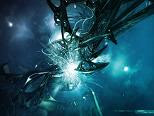In parts of feudal Scotland and England, a sin eater was a person, usually a beggar, chosen to cleanse the sins of the dead in a ritual that involved the consumption of bread and wine, which were left on the dead person's breast during their burial. The ritual ended with the recitation of a prayer ("For thy peace, I pawn my own soul"), after which the sin eater would return to his abode of solitude until his service was needed once more. In this slow-paced, but emotional film, Peter Wingfield (Highlander) is the Sin Eater, who skulks about the woodlands of Dead Man's Mountain in a drab ensemble likened to the Ghost of Christmas Past. Langdon's attempt at diffusing fear on the audience falls flat, but not without the reservation that perhaps it is not fear that he wishes to achieve, but sympathy for a man ostracized by his fellow men in correspondence with a crude and primitive tradition. Aside from the emotional venue, however, the film lacks, for the most part, one vital element: good acting. This may be the fault of two things: 1) Bad actors or 2) The strained attempts at establishing time and setting by having all the characters speak in the vernacular. Audiences may find the up-lifting soundtrack by composer Mark McKenzie to be easier on the ears. Even Louise Fletcher, in her role as the village elder, Miz Elda, appears unskilled, with a Welsh accent that is laudable only when compared with the almost incomprehensible speech of Stewart Finlay-McLennan, who rubs off as a raging idiot rather than a domineering antagonist. With regards to plot, Henry Thomas (E.T., Legends of the Fall), as the unnamed missionary, appears as a bump in the road with an intruding performance that flows in the written story, but fails to properly adapt to the 117 minutes on camera. Fletcher (an Academy Award winner) and Thomas (a Golden Globe Nominee) are little more than a big name and a not-so-big name used by producers as a promotional tool. One name that should be noted, however, is Liana Liberato, who went from a small part in a episode of CSI: Miami to the role of Cadi Forbes, and is the only believable actor, from her "dunnas" to her "glyns," to overall bearing, in the entire film. Fundamentally, The Last Sin Eater is a garden-variety, verging on dull, production that lovers of religious media will enjoy immensely, but, to the average viewer, is little more than a satisfactory book-to-big screen adaptation.



No comments:
Post a Comment